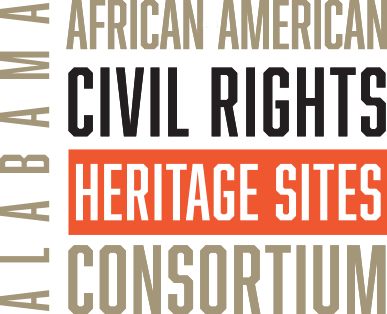Our Story

The Alabama African American Civil Rights Heritage Sites Consortium includes places of worship, lodging and civic engagement that played a significant role in the African American struggle for freedom. Located in the iconic civil rights cities of Birmingham, Montgomery and Selma as well as the rural Black Belt, these sites trace their significance from the era of the Civil War and Reconstruction, disenfranchisement and Jim Crow resistance of the late 19th and early 20th centuries through the anti-lynching campaign of the 1920s. Alabama is unique in that it is home to three cities that launched pivotal movements in the civil rights struggle of the mid-20th century – the Montgomery Bus Boycott of 1955, Birmingham Children’s Campaign of 1963 and Selma Voting Rights March of 1965. These sites are the stewards of the history of the most important social movement of the 20th century.
In October 2017, the global significance of these sites was recognized by the World Monuments Fund (WMF) when it included the Consortium on its 2018 Watch. The World Monuments Watch is a biennial selection of at-risk cultural heritage sites that combine great historical significance with contemporary social impact. Recognition by this premier global heritage preservation organization increased the Consortium sites’ visibility and credibility with a worldwide audience. (The Consortium was one of only two North American honorees (of 25) included in the 2018 Watch.) Highlighting these places as sites of social movements, the 2018 WMF Watch Magazine noted that the Consortium “provides a strong representation of a defining moment in American history…Placement on the 2018 Watch seeks to ensure not only the physical survival of these sites, but also the protection of hundreds of stories of courage, freedom, and equality.”
The Consortium began as a project of the Birmingham Civil Rights Institute (BCRI). With support from the Educational Foundation of America, BCRI established a team to coordinate the World Monuments Fund nomination. At the first convening, representatives from the sites discovered common passions, goals and needs. Their shared concerns focused on preserving the historic buildings, collecting the people’s stories, and sharing their legacy with a new generation. These committed volunteers, who had been working with limited resources in relative isolation, discovered a cadre of fellow laborers. The nominating process became a catalyst for collaboration and communication. These early conversations between BCRI staff, funders and the site representatives highlighted the need for sustained communication and support.
This meeting and subsequent nomination was followed by a needs assessment that established the framework of collaborative leadership and self-determination that are the guiding principles for the Alabama African American Civil Rights Heritage Sites Consortium. Site capacity-building and sustainability are the key objectives. The Consortium’s programmatic activities have developed in response to site representative surveys, assessments, and discussions. In two years, an ad hoc group of volunteers evolved into a dynamic, cohesive collaborative team, working together to fulfill their individual and collective commitment to long-term success. This cohesion is the result of a series of workshops and training, documentation, networking, and public relations initiatives that were developed in response to the stated needs of the Consortium sites.
The organization holds a unique position within the state in that its membership crosses geographic boundaries, religious denominations, and financial realities. It maintains relationships with partner organizations while retaining independent funding and oversight. As national consciousness has returned its focus to Civil Rights and human rights, the Consortium increasingly fields programming requests from potential partners and funders who have identified shared goals.
The role of the Consortium continues to evolve. What began as a project incubated within the Birmingham Civil Rights Institute is now a multi-pronged organization, operating as an independent 501c3 organization with its own mission and scope. It exists to build capacity among its members by identifying needs and coordinating a strategic response that engages community partners, funders and other organizations.
